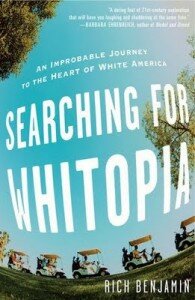The unfortunate misdirection of a journey into whiteness
Originally published at Psychology Today’s Between the Lines blog (original post)
Rich Benjamin, an African American journalist (yes, his race matters) spent over two years (2007-2009) criss-crossing the country, traveling some 27,000 miles to document the latest manifestation of “white flight” — the migration of white residents from cities and

Richard Benjamin's new book may become a big hit. But for whom?
integrated suburbs to cloistered, racially homogeneous enclaves that Benjamin calls “Whitopias.” According to a recent article in Time, such communities have grown at triple the rate of the average U.S. city in recent years, providing yet further evidence that we are far indeed from a post-racial society. Benjamin, who has a Ph.D. in literature from Stanford, chronicled his long journey in a new book Searching for Whitopia: An Improbable Journey to the Heart of White America.
Benjamin’s is a worthwhile project. White attitudes towards people of color are becoming less explicitly hateful (in the nature of the Klan) and increasingly more avoidant, in exactly the way that Benjamin suggests. Migration trends like this should be documented and discussed, and I look forward to seeing Benjamin’s book, which was just released this month. But after reading the Time interview, I have some serious concerns about Benjamin’s interpretation of his interviews and observations, as well as about the overall impact of this project.
In the interview [available here ], Benjamin said that he was “caught off-guard by how pleasant an experience it turned out to be [to spend time in these white communities] and mentioned “the personable warmth that greeted me in many cases.” He also was surprised by how much he enjoyed golf, explaining
I feel like golf courses are the seductive emblem of Whitopia, and I didn’t think I could get the essence of the place without learning myself. What I thought was a chore turned out to be a labor of love.

Benjamin's characterization of golf courses as "the seductive emblem of whitopia" is telling.
And then he had this to say about his time with a white separatist group in Idaho:
I just stumbled upon it. There’s a religious sect called Christian Identity, which is a religious arm of the Aryan Nation. When I was in northern Idaho I sat in on a three-day retreat, and had some fascinating conversations. It was just a bizarre experience… They were curious and shocked they had found a black man on their premises. A lot of the members of the church took pains to explain to me the difference between white supremacy and white separatism. They said, “We don’t think we’re better than you, we just want to be separate from you.”
That’s it. There was no “but” or “however” or any attempt to unpack or analyze this experience beyond labeling it as “bizarre”. By the time I reached the end of the interview, I was practically feeling warm and fuzzy about the Christian Identity folks. On the other hand, I was pretty livid with Benjamin!
I’m delighted that he enjoyed golf and that the white separatists were nice to him. It’s certainly better than the alternative of being physically attacked or insulted, but Dr. Benjamin was being used.
These days, White separatists and White supremacists alike have a public relations problem. Their belief-system and worldview in general have come under fire from a white majority that would much prefer to not see race at all and, therefore, not have to deal with it politically and interpersonally. This dominant racial ideology – Colorblindness – despises the rhetoric of white supremacy and separatism because both are vivid reminders that racism is alive and well. As a result, mainstream (White) America has stigmatized and otherwise made life uncomfortable for White supremacists and separatists, who would like nothing better than to see their “lifestyle” regain its previous status of mainstream legitimacy.

This isn't the kind of "white flight" Benjamin was writing about. Many experts consider that kind to be primarily a flight from Blackness, rather than poverty.
Given this sociopolitical context, Rich Benjamin’s surprise appearance at a White separatist meeting presented the group with a unique opportunity to try to reshape the public opinion. This potential gain of being “nice” to Benjamin outweighed pretty much all other considerations, especially since Benjamin was never actually going to, you know, move into the neighborhood. That, after all, would present some difficulties for a White separatist group.
Benjamin was not, of course, planning to stay. He just wanted to visit for a spell so that he could write his book, a book that the members of the Christian Identity church clearly saw as something that could give them mainstream legitimacy and the opportunity to say, in perfectly good consciousness, “See, even African Americans say we’re nice”. Benjamin delivered! Big Time!
And the so-called distinction between White supremacy and White separatism that members of the Christian Identity church “took pains” to make? Benjamin seems to accept this distinction at face value. He shouldn’t. To the extent that there is any difference at all, it’s one of strategy (and maybe political expediency) not values or beliefs. For the most part, though their language is sometimes more subtle, White separatists talk about the differences between whites and non-whites in the same hierarchical way as White supremacists.
Apparently Benjamin didn’t get a taste of that during his visit. I take him at his word that everyone was nice, but what do you think happened after his “nice” visit came to an end? Most explicit racism these days happens behind closed doors when there is no danger of being overheard. I wasn’t there, and this is obviously just a guess, but my guess is that they’re still laughing and talking about his visit. And one does not need a Ph.D. in literature to imagine the specific word choices that are likely being used.
Author: Mikhail Lyubansky (11 Articles)

Mikhail Lyubansky, Ph.D., is a member of the teaching faculty in the Department of Psychology at the University of Illinois, Urbana-Champaign, where he teaches Psychology of Race and Ethnicity and Theories of Psychotherapy. His research and writing interests include racial/ethnic group relations and restorative justice. He is a regular contributor to anthologies on popular culture, including Harry Potter, Buffy the Vampire Slayer, and House MD, published by BenBella and recently co-authored a book on the Russian-Jewish diaspora: Building a diaspora: Russian Jews in Israel, Germany, and the United States. In addition to his PT blog Between the Lines, he is a managing editor at http://www.OpEdNews.com All material on this site published under his byline remains the property of Mikhail Lyubansky, copyright 2009, 2010. Permission is granted to repost and distribute, with proper attribution. Born in Kiev, Mikhail immigrated with his family to the United States as a child in 1977.


COMMENTS